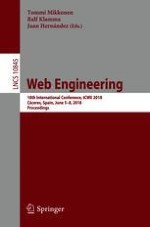
2018 | OriginalPaper | Buchkapitel
Evaluating the Impact of Developers’ Personality on the Intention to Adopt Model-Driven Web Engineering Approaches: An Observational Study
verfasst von : Glenda Toala, Mauricio Diéguez, Cristina Cachero, Santiago Meliá
Erschienen in: Web Engineering
Aktivieren Sie unsere intelligente Suche, um passende Fachinhalte oder Patente zu finden.
Wählen Sie Textabschnitte aus um mit Künstlicher Intelligenz passenden Patente zu finden. powered by
Markieren Sie Textabschnitte, um KI-gestützt weitere passende Inhalte zu finden. powered by